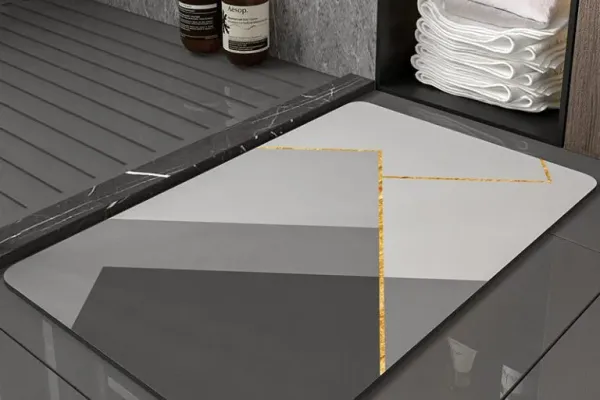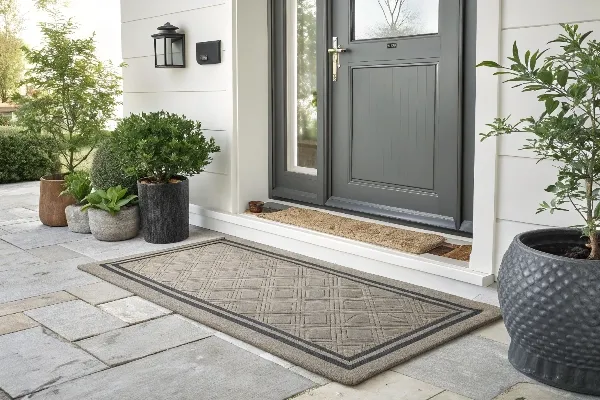Are you tired of muddy footprints trailing through your entryway every time it rains? Does your current outdoor doormat turn into a soggy, useless mess in wet weather, failing to stop dirt and debris from entering your home? You need a solution that actually works, a durable, effective outdoor doormat designed specifically to handle wet conditions and keep your floors clean and safe.
Le meilleur paillasson extérieur pour les zones humides is one constructed from materials that are inherently water-resistant, quick-drying, and possess excellent scraping capabilities. Look for paillassons made from rubber, synthetic fibers like polypropylene or polyester, specialized designs such as Waterhog doormats, or unique options like lobster rope doormats. Ces tapis effectively piéger la saleté and moisture from shoes while allowing water to drain through or evaporate quickly, ensuring they remain functional even when wet.
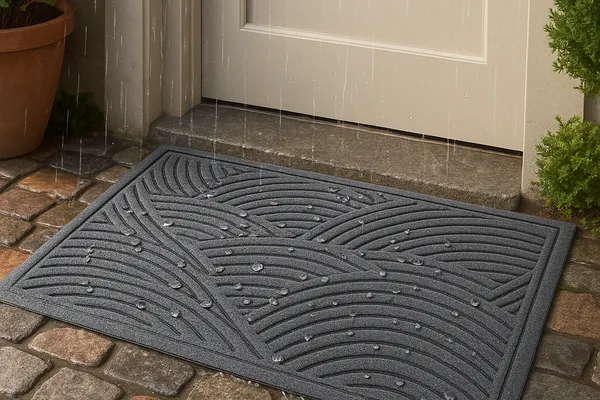
Why Does Your Outdoor Doormat Material Matter So Much in Wet Weather?
Choosing the right material for your outdoor doormat is paramount, especially when dealing with frequent rain, snow, or mud. The wrong tapis material can quickly become saturated, lose its shape, harbor mold or mildew, and, worst of all, fail at its primary job: keeping dirt and moisture outside. A standard paillasson not designed for wet conditions might look nice initially but will disappoint when the weather turns. Think about how much water a soggy tapis can track inside!
Materials react differently to moisture. Some absorb water like a sponge (like untreated fibre naturelle tapis), becoming heavy and ineffective. Others repel water or allow it to pass through easily. For an paillasson extérieur facing the elements, you need the best possible performance. Key properties to look for include:
-
Water Resistance/Drainage: Le tapis should either repel water or allow it to drain through quickly, preventing puddling on the surface area.
-
Quick Drying: UN tapis that stays wet becomes a breeding ground for unpleasantness and less effective at scraping. Materials that dry quickly are essential.
-
Durabilité: Le tapis must résister à constant exposure to sun, rain, and foot traffic without degrading, cracking, or fading excessively. Durable construction is key.
-
Scraping Ability: The texture and fibre de la tapis should be coarse enough to effectively enlever la saleté, mud and debris from shoes.
As manufacturers, we understand these material science nuances deeply. We select and process materials specifically to maximize these properties, ensuring every outdoor doormat we produce offers reliable performance, especially in challenging temps pluvieux. Whether it’s a heavy-duty rubber tapis or a cleverly designed synthetic fiber mat, the goal is consistent effectiveness.
What Makes a Doormat Truly Waterproof and Ideal for Rain and Mud?
The term “étanche” can be a bit misleading with paillassons. Very few tapis are completely impervious to water in the way a raincoat is. Instead, the best outdoor doormats pour zones humides manage water effectively. A truly effective doormat for rain and mud typically has several characteristics working together. It’s not just about shedding water; it’s about handling saleté et humidité simultanément.
Firstly, the material itself is crucial. Rubber and certain plastics like vinyle are inherently water-resistant. Synthetic fibers like polypropylene and polyester don’t absorb much water et dry quickly. These materials form the foundation of a good weatherproof paillasson extérieur. Secondly, the construction plays a vital role. Many effective paillassons d'extérieur feature raised patterns or channels. This design scrapes debris from shoes et allows water to flow away from the main walking surface, preventing the tapis from becoming waterlogged. Some designs even incorporate drainage holes.
Finally, a non-slip backing, often made of rubber, is essential. This ensures the tapis stays in place, even when wet, preventing slips and falls. It also helps create a barrier, preventing water onto the surface beneath the tapis. UN paillasson that combines water-resistant materials, a smart drainage-focused design, and a sturdy backing is what you should be looking for when choosing an outdoor doormat designed to tackle rain and mud. These features define a truly functional waterproof outdoor solution.
Exploring the Best Outdoor Doormat Options: Coir vs. Rubber vs. Synthetic Fibers
Lors de la recherche de la best outdoor doormat, you’ll encounter several common material types. Each has its pros and cons, especially concerning performance in wet conditions. Let’s compare the big three: fibre de coco, rubber, and synthetic fibers.
-
Coir Doormats: Made from coconut husks, tapis en fibre de coco are popular for their natural look and excellent scraping ability when dry. However, traditional paillassons en fibre de coco have a major drawback: they absorb water. In zones humides, they can become saturated, heavy, prone to mildew, and shed fibers. While some tapis en fibre de coco avoir vinyle or rubber backing to mitigate water seepage, the coir fiber itself remains absorbent. They are generally better suited for covered porches or drier climates. Coco mats offer a rustic charm but aren’t the top pick for persistent wetness.
-
Tapis en caoutchouc : Often made from recycled materials, rubber paillassons are exceptionally durable and highly water-resistant. They typically feature textured surfaces or holes for scraping and drainage. Rubber tapis don’t absorb water, dry quickly, and are easy to clean – just tuyau them down. Their weight helps them rester en place. While perhaps less decorative than fibre de coco, their functionality in temps pluvieux is superior. They are a workhorse tapis.
-
Synthetic Fiber Mats: Paillassons made from polypropylene, polyester, or nylon offer a great balance of features. These fiber mats are designed to mimic the appearance of carpet or natural fibers but offer superior water resistance and durability for utilisation en extérieur. They often feature abrasive surfaces to piéger la saleté and moisture effectively. Many (like the popular Waterhog paillasson) have bi-level construction where the lower level traps water, keeping the upper surface drier. These tapis come in various colors and patterns, offering both function and style. They represent some of the best doormats pour intérieur et extérieur transitions in wet climates.
Material Comparison Table:
| Fonctionnalité | Paillassons en fibre de coco | Tapis en caoutchouc | Synthetic Fiber Mats (e.g., Polypropylene) |
| Résistance à l'eau | Poor (Absorbent) | Excellent | Very Good to Excellent |
| Drying Speed | Slow | Fast | Fast |
| Scraping Ability | Good (when dry) | Good to Excellent | Very Good to Excellent |
| Durabilité | Modéré | Excellent | Very Good to Excellent |
| Mold Resistance | Pauvre | Excellent | Good to Very Good |
| Entretien | Sheds, potential mildew | Easy (Hose down) | Easy (Hose down, vacuum) |
| Best Use Case | Covered porch, dry climate | Uncovered areas, heavy rain | Uncovered areas, all-weather, style needed |
As a manufacturer, we produce paillassons using various materials, including high-quality PVC and synthetic blends designed specifically for outdoor resilience and water management. We understand the demand for both function and aesthetics, offering options that deliver on both fronts for our B2B clients seeking reliable paillassons d'extérieur.
How Do Lobster Rope Doormats Perform in Rainy Conditions?
A unique and increasingly popular option, especially in coastal regions like New England, is the lobster rope doormat. Ces doormats are made from the same tough, étanche polypropylene or polyethylene rope used in the lobster fishing industry (sometimes new, sometimes reclaimed). This heritage speaks volumes about their potential durability and resistance to harsh marine environments. How does this translate to performance as an outdoor doormat in the rain?
The key advantage of lobster rope doormats lies in their tisser. The open tisser construction allows water (and dirt/sand) to pass straight through the tapis. This means they don’t hold water, preventing them from becoming soggy or waterlogged, even during heavy rain. They dry quickly simply because there’s nothing substantial to hold the moisture. The tough rope material itself is inherently resistant to water, mold, and mildew.
Furthermore, the texture of the woven rope provides a decent scraping surface to help enlever la saleté and debris from shoes before entering your home. While perhaps not as aggressively abrasive as some specialized guard doormat designs, they are effective for general use. They are also known for being quite durable and resistant to fading from UV exposure. Brands like the New England Trading Co. have popularized these rope mats. For areas experiencing frequent rain, lobster rope doormats offer a stylish, functional, and extremely water-friendly solution. Their unique look and performance make them a strong contender among the best outdoor doormats pour wet conditions.
Choosing the Right Size and Shape for Your Outdoor Door Mat
Beyond material and construction, the size and shape of your outdoor doormat significantly impact its effectiveness and aesthetic appeal. An undersized tapis is one of the most common mistakes; people often don’t take enough steps on it to effectively clean their shoes. A tapis that’s too small simply won’t do a thorough job of stopping dirt.
As a general rule, your paillasson extérieur should be at least 80% as wide as the door it serves. For a standard 36-inch door, aim for a tapis that is at least 28-30 inches wide. For wider entrances or double door setups, you’ll need a correspondingly larger tapis to ensure adequate surface area for foot wiping. Consider the depth too; people need enough space to take a full step or two onto the tapis. A common recommendation is a depth of at least 22 inches, but 30 inches or more is often better, especially for high-traffic areas or places prone to mud and debris.
Le doormat shape is often rectangular, which is practical and fits most doorways well. However, half-moon, oval, or custom shapes are also available and can add a decorative touch. Consider the space available and the overall style of your entrance when selecting a shape. Ultimately, the right doormat size allows ample space for effective shoe cleaning before anyone steps inside the door. We offer customization in size and shape, allowing our clients (importers, retailers) to order paillassons perfectly suited to their customers’ specific needs and architectural styles, ensuring they can trouver le meilleur fit. Check out some options like these versatile tapis de porte d'entrée extérieur antidérapants commerciaux à chevrons which come in standard sizes but highlight durable patterns.
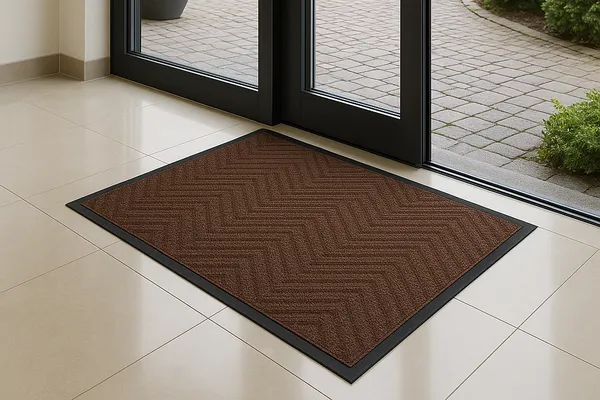
How to Properly Clean and Maintain Your Waterproof Outdoor Doormat?
Even the best outdoor doormat needs occasional cleaning to maintain its appearance and effectiveness. Thankfully, tapis designed for wet weather are usually easy to care for. Proper maintenance ensures your tapis continues to effectively piéger la saleté and water for years to come.
For most rubber, vinyle, synthetic fiber (Waterhog, polypropylene), and lobster rope doormats, cleaning is straightforward:
-
Shake it Out: Regularly shake the tapis vigorously to dislodge loose saleté et débris.
-
Vide: For finer particles and embedded dirt, especially on synthetic fiber mats, vacuuming can be very effective.
-
Hose it Down: The easiest way to clean most waterproof outdoor paillassons is to simply spray them with a garden tuyau. This usually removes accumulated mud and grime. For stubborn spots, you might use a mild detergent and a soft brush.
-
Air Dry: Always allow the tapis to dry completely before placing it back. Since these les tapis sont fabriqués à dry quickly, this usually doesn’t take long, especially if hung or propped up to allow air circulation. Avoid placing a wet tapis directly on sensitive surfaces like wood decking for extended periods.
Paillassons en fibre de coco require slightly different care. Avoid soaking them. Instead, brush or vacuum them clean. If they get wet, ensure they dry thoroughly in the sun to prevent mold.
Regular cleaning prevents dirt buildup, which can reduce the mat’s scraping efficiency and eventually lead to staining or degradation. A clean tapis not only looks better but performs better, contributing to a cleaner intérieur environment. As manufacturers, we provide care instructions with our products, ensuring end-users can easily maintain their durable paillassons.
Can You Use an Indoor Doormat Outside in Wet Conditions? (Spoiler: Not Recommended!)
It might be tempting to use a decorative paillasson d'intérieur outside, especially if you prefer its style. However, this is generally not advisable, particularly in areas exposed to rain and mud. Intérieur paillassons are typically designed for different priorities – softer textures, absorbing fine dust, and complementing interior decor. They usually lack the specific features needed to résister à outdoor elements and effectively manage heavy saleté et humidité.
La plupart intérieur tapis, en particulier cotton mats or those with plush carpeting, absorb water readily and lack drainage. Placing one outside in the rain will likely result in a permanently soggy, heavy tapis that promotes mold growth and becomes ineffective at cleaning shoes. The materials used for intérieur tapis are often not UV-resistant and can fade, crack, or disintegrate quickly when exposed to sun and harsh weather. Furthermore, their backings might not be designed to rester en place on wet outdoor surfaces, potentially creating a slipping hazard.
For optimal performance and longevity, always use a paillasson specifically designed for utilisation en extérieur in areas exposed to the elements. Use your stylish paillasson d'intérieur inside the door as a secondary barrier to catch any remaining fine particles or moisture. Having a two-mat system (one rugged outdoor doormat, one absorbent paillasson d'intérieur) is often the best overall strategy for keeping dirt out of your home, especially during temps pluvieux. We produce distinct lines for intérieur et de plein air applications, recognizing the very different demands placed on each type of tapis. Consider options like our usine de vente en gros de tapis de porte en bobine de PVC for a welcoming yet functional outdoor choice.
Beyond Functionality: Style and Design in Outdoor Doormats
While functionality is key for an outdoor doormat dans zones humides, aesthetics still matter! Your paillassons de porte d'entrée are often the first impression visitors have of your home or business. Thankfully, you don’t have to sacrifice style for performance. Modern manufacturing techniques allow for a wide variety of designs, colors, and textures even in highly durable et weatherproof matériels.
Caoutchouc tapis can feature intricate patterns, from classic wrought-iron looks to modern geometric designs. Synthetic fiber mats offer the widest range of colors and patterns, capable of mimicking traditional tapis designs or offering bold, contemporary statements. Even functional designs like the Waterhog doormat come in various colors to better match exterior palettes. Lobster rope doormats offer a unique, nautical charm with different color combinations available. You can find paillassons with welcoming messages, personalized monograms, or elegant borders. Consider options like Paillassons en relief 3D which add texture and visual interest while still being functional.
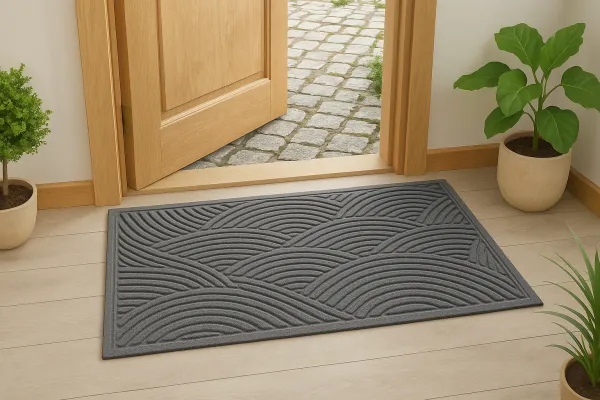
Quand choosing an outdoor doormat, consider how it complements your home’s architecture, door color, and landscaping. A well-chosen tapis enhances curb appeal. As custom tapis manufacturers, we work closely with our clients (retailers, brands, distributors) to develop paillassons that meet both functional requirements and current design trends. We offer extensive customization options in pattern, color, and size, ensuring you can source tapis that appeal to diverse consumer tastes, from purely practical service intensif styles like Paillassons d'accueil à double bande très résistants to more decorative options.
Partnering with a Custom Mat Manufacturer for Your Needs
For importers, distributors, retail chains, e-commerce sellers, and brands looking for reliable, high-quality paillassons d'extérieur – especially those designed for challenging wet conditions – partnering directly with an experienced manufacturing plant like ours offers significant advantages. We understand the technical specifications required to produce truly effective paillassons que résister à the elements, piéger la saleté efficiently, and offer long-lasting value.
We offer:
-
Expertise in Materials: Deep knowledge of rubber, PVC, polypropylene, polyester, and other materials suited for durable, waterproof outdoor tapis. We can recommend the best options based on target climate and performance needs.
-
Personnalisation : We can produce paillassons to your exact specifications, including size, shape, color, pattern, and branding (private label). Whether you need service intensif guard doormats or stylish paillasson de bienvenue designs, we can deliver.
-
Quality Control: Rigorous checks throughout the manufacturing process ensure every tapis meets high standards for durability, functionality, and appearance. This consistency is crucial for your brand reputation.
-
Scalability: Our production capacity can handle large orders for retail chains or smaller, specialized batches for boutique brands or promotional needs.
-
Eco-Friendly Options: We are committed to sustainability and offer options utilizing recycled materials, such as recycled Waterhog doormat alternatives or recycled rubber tapis.
-
Diverse Product Range: Beyond paillassons d'extérieur, we manufacture a wide array of matting products, including tapis de cuisine, bath tapis, tapis pour animaux de compagnie, chair tapis, and even specialized flooring like piste de danse solutions.
If you’re looking for a mat supplier that combines quality manufacturing, design flexibility, and a focus on performance – especially for demanding de plein air applications – we are here to help. We pride ourselves on building long-term relationships with our B2B clients, providing them with the tapis solutions they need to succeed in their markets. Contactez-nous aujourd'hui to discuss your specific requirements and learn how we can become your trusted partner in custom tapis production.
Frequently Asked Questions (FAQs)
What material is best for an outdoor doormat that gets rained on?
Rubber, polypropylene, polyester, and specially treated synthetic fibers are generally the best materials. They resist water absorption, dry quickly, and are durable against weather exposure. Designs like Waterhog doormats ou lobster rope doormats are specifically engineered to handle much water et piéger la saleté efficacement.
Do coir doormats hold up in the rain?
Traditionnel paillassons en fibre de coco absorb water and can degrade, shed, and develop mildew when consistently exposed to heavy rain. While they offer good scraping when dry, they are not ideal for uncovered zones humides. They perform better under a covered porch or in drier climates.
How thick should an outdoor doormat be?
Thickness isn’t the only factor, but a good outdoor doormat should be substantial enough to provide effective scraping and stay in place. Look for tapis between 1/4 inch and 1 inch thick, depending on the material and design. Ensure it’s not so thick that it obstructs door clearance or creates a tripping hazard. The mat features, like raised patterns, contribute more to effectiveness than sheer thickness.
How do you keep an outdoor mat from getting moldy?
Choose materials inherently resistant to mold, like rubber or synthetics (polypropylene, polyester). Ensure the tapis has good drainage or dries quickly. Lobster rope doormats are excellent as water passes right through. Regular cleaning (hosing down) and allowing the tapis to dry completely also prevents mold growth. Avoid tapis that stay soggy, like untreated fibre de coco.
What is the difference between an outdoor mat and an indoor mat?
Tapis d'extérieur prioritize durability, weather resistance (UV, rain), water drainage/quick drying, and aggressive dirt/mud scraping. Indoor mats focus more on absorbing fine dust and moisture, protecting floors, comfort, and aesthetics matching interior decor. Using an tapis d'intérieur outside, especially in wet weather, is generally not recommended as it won’t perform well or last long.
Can I put a rubber backed mat on any outdoor surface?
Support en caoutchouc is great for keeping a tapis en place and protecting the surface beneath. However, on some surfaces like certain wood decks or specific types of stone, prolonged contact with a wet rubber-backed tapis could potentially cause discoloration. It’s always wise to check the recommendations for your specific decking or patio material and lift the tapis occasionally to allow the area underneath to dry completely, especially after heavy rain.
Key Takeaways for Choosing the Best Outdoor Doormat for Wet Areas
-
Material Matters Most: Prioritize water-resistant, quick-drying materials like rubber, polypropylene, or polyester for areas exposed to rain and mud. Avoid untreated fibre de coco.
-
Design for Drainage: Rechercher tapis with textured surfaces, channels, or open weaves (like lobster rope doormats) that allow water to drain away or be trapped below the surface (Waterhog doormats).
-
Size Correctly: Assurez-vous que tapis is wide enough (at least 80% of door width) and deep enough (min. 22-30 inches) for effective shoe cleaning.
-
Prioritize Durability: Choisissez un service intensif, weatherproof tapis designed to résister à outdoor conditions and foot traffic.
-
Entretien facile : Optez pour tapis that can be easily cleaned by shaking, vacuuming, or hosing down.
-
Consider a System: Use a rugged outdoor doormat outside and an absorbent paillasson d'intérieur inside for maximum floor protection.
-
Partner Wisely: For businesses, working with a specialized custom mat manufacturer ensures quality, customization, and reliable supply for the best outdoor doormats.



